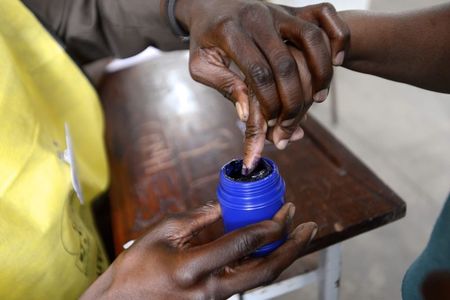By Pascal Fletcher and Manuel Mucari
MAPUTO (Reuters) - Mozambicans voted on Wednesday in elections expected to return the ruling Frelimo party to power in one of Africa's fastest-growing economies, and international observers reported voting was generally smooth and peaceful.
Lines formed at polling stations in the port capital Maputo, as voters waited patiently to make their choice in the elections for a new president, parliament and provincial assemblies.
"People want to vote," said Leonor Manuel, the election official presiding over one station crowded with voters at a school in the neighbourhood of Polana Canico A, a labyrinth of dusty tracks squeezed between jumbled ramshackle homes.
Foreign donors and investors hope the ballot will help to bury old animosities still lingering from a 1975-1992 civil war fought between Frelimo and its old foe Renamo.
More than 10 million voters were registered to take part in the elections in the Indian Ocean nation, whose 2,500 km (1,550 mile) coast extends from Tanzania in the north to South Africa.
Ordinary Mozambicans say they want whoever wins the vote to use newly-discovered coal and natural gas reserves to end poverty and inequality and to provide jobs.
"This country has natural riches, from Rovuma to Maputo, but they are still not being converted into benefits for the people," said voter Alberto Eduardo, 44, a delivery worker.
Frelimo is a former Marxist liberation movement that has ruled Mozambique since independence in 1975.
Its presidential candidate, former defence minister Filipe Nyusi, faces a determined challenge from both the Renamo leader and former rebel chief Afonso Dhlakama and from a rising third force in the former Portuguese colony - Daviz Simango and his Mozambique Democratic Movement (MDM).
Outgoing Frelimo President Armando Guebuza is barred by the constitution from standing for a third term.
The election, the fifth presidential vote since a 1992 peace deal ended the civil war, is "the most competitive in the history of the country", John Stremlau, vice president of peace programmes at the Atlanta-based Carter Center, told Reuters.
Stremlau, one of more than 1,000 international observers who were monitoring the elections, described the morning's voting as "so far, so good".
The head of the European Union observer mission, Judith Sargentini agreed. "It looks like the opening was calm," said Sargentini, a member of the European Parliament from the Netherlands, noting only a few reports of delays and problems.
Polls were due to close at 6 p.m. (1600 GMT).
INTERNATIONAL INTEREST
Some observers predict a close race. If Frelimo's Nyusi, 55, fails to secure more than 50 percent of the total vote, he will face a deciding second round run-off with his nearest contender in which the anti-Frelimo votes would be united against him.
The new president will oversee the bringing into production of large-scale offshore natural gas and oil projects in the north already being developed by investors such as U.S. oil major Anadarko Petroleum Corp and Italy's Eni.
The raging Ebola epidemic in three West African nations has cast a pall over the wider region, but Mozambique in the southeast corner of Africa is so far Ebola-free.
The IMF sees its gross domestic product (GDP) growth topping eight percent this year, though most of its more than 25 million people still live in poverty.
"The real test of this transition moment is whether the political leaders who have historically fought each other will think in terms of a government of national unity, so that you will have inclusivity in the aftermath," Stremlau said.
He noted all of the main political leaders had said they would accept the result.
CALLS FOR EQUALITY, INCLUSION
In their campaigns, Renamo's Dhlakama and MDM's Simango attacked what they say is the stranglehold Frelimo has long maintained over political and economic power in Mozambique.
"Mozambique belongs to everyone" was the slogan of Simango, 50, a Renamo defector and civil engineer who made a credible first showing in the 2009 presidential vote and whose party made gains in local government elections last year.
In the two years before the vote, Dhlakama's armed Renamo partisans clashed sporadically with government troops and police and ambushed traffic on a key north-south highway, triggering some concerns Mozambique could slide back into civil war.
The white-haired, bespectacled former guerrilla leader, who is 61, only emerged from a mountain hideout last month to ratify a deal with outgoing president Guebuza reaffirming a 1992 peace pact.
Former Kenyan Prime Minister Raila Odinga, heading an observer mission from the Electoral Institute for Sustainable Democracy in Africa (EISA), said a peaceful outcome to the election was important not just for Mozambique but for Africa.

"Stability or instability in Mozambique affects the whole region," he said.
(Editing by Gareth Jones and Ruth Pitchford)
